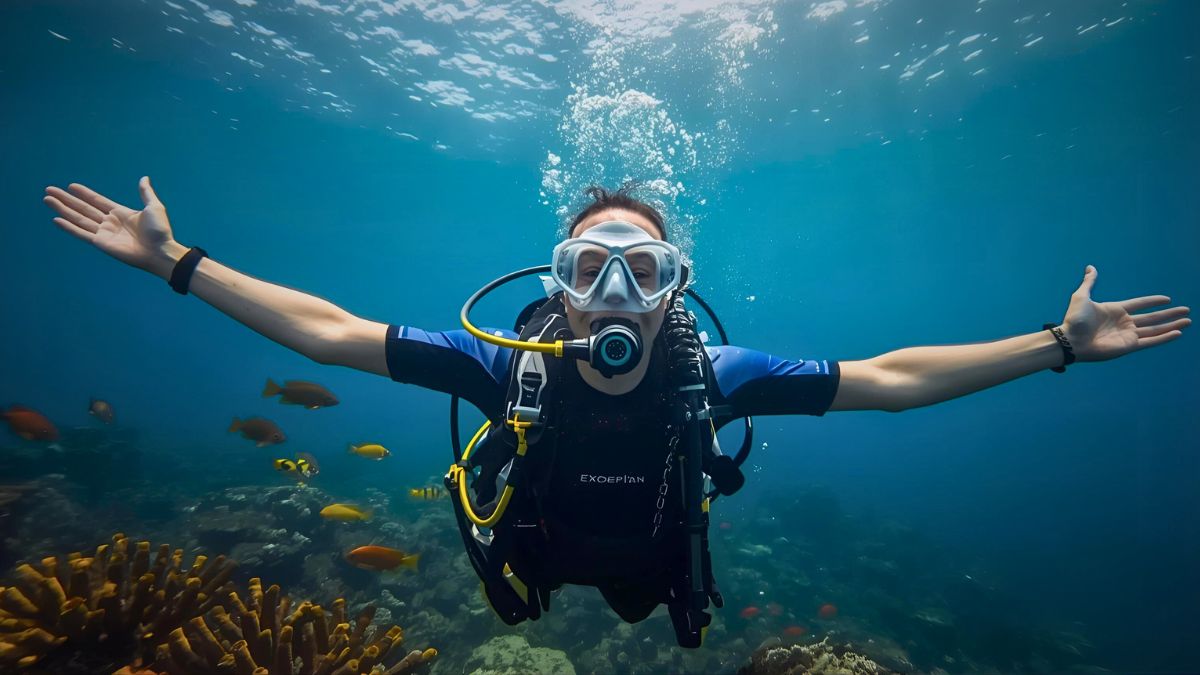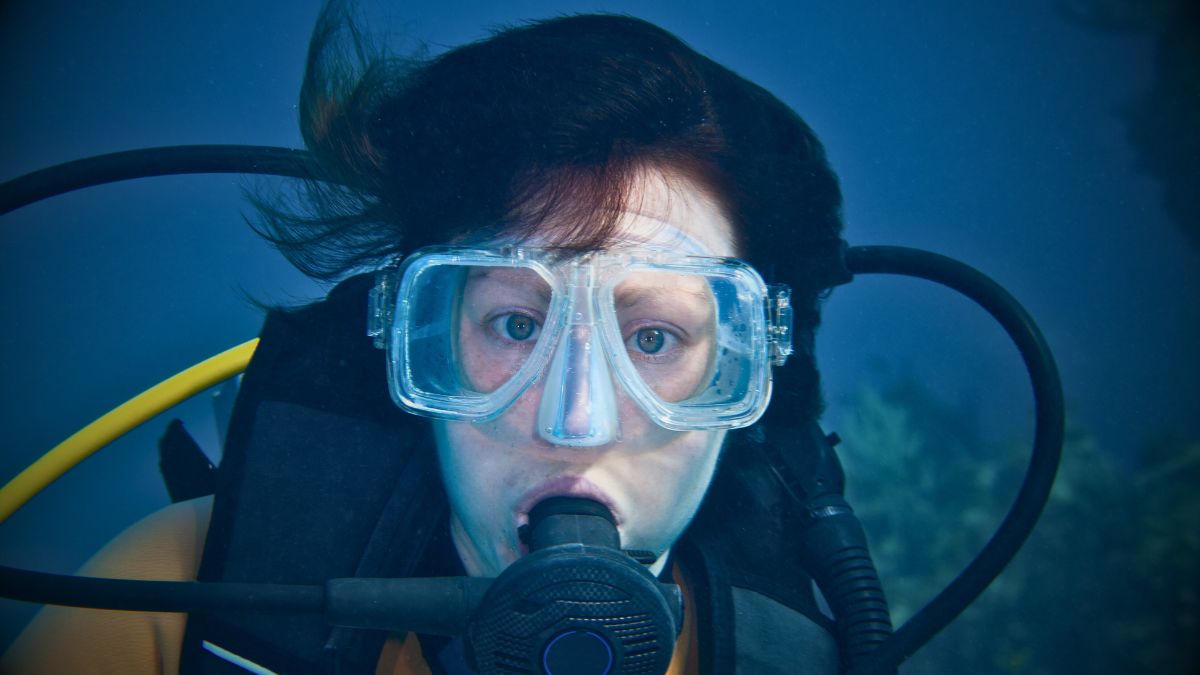Are you fascinated by the mysteries hidden beneath the ocean’s surface? Whether you’re considering your first dive or simply curious about this incredible sport, scuba diving opens up a world that most people never experience.
Let me share some amazing scuba diving facts that reveal why millions worldwide have fallen in love with exploring underwater.
Scuba diving is more than a hobby. It’s a gateway to discovering 71% of our planet that remains largely unexplored. From swimming alongside sea turtles to exploring ancient shipwrecks, diving offers adventures that simply don’t exist on land.
What Is Scuba Diving?
Scuba diving allows you to breathe and explore beneath the water’s surface for extended periods. The word “SCUBA” stands for Self-Contained Underwater Breathing Apparatus, meaning you carry your own air supply and have complete freedom to move underwater.
Unlike snorkeling where you stay at the surface, scuba diving lets you descend deep and spend 30 minutes to over an hour exploring. Unlike freediving where you hold your breath, scuba allows you to breathe normally and comfortably while submerged.
Did you know? The term “SCUBA” was originally a military code name created in 1954 by Dr. Christian Lambertsen for rebreathers used by Navy frogmen. It became a common word only about a decade later.
One of the best scuba diving facts? Almost anyone can learn. You don’t need to be an athlete or strong swimmer. If you’re reasonably healthy and comfortable in water, you can become a certified diver.
How Did Scuba Diving Begin?
Modern scuba diving began in 1943 when French explorer Jacques Cousteau and engineer Émile Gagnan invented the Aqua-Lung regulator. This device allowed divers to breathe compressed air automatically, making underwater exploration accessible for the first time.
Before this breakthrough, divers used cumbersome equipment connected to surface air pumps. Ancient Greeks used hollow plant stems, and in the 1600s, people experimented with “diving bells” that trapped air inside.
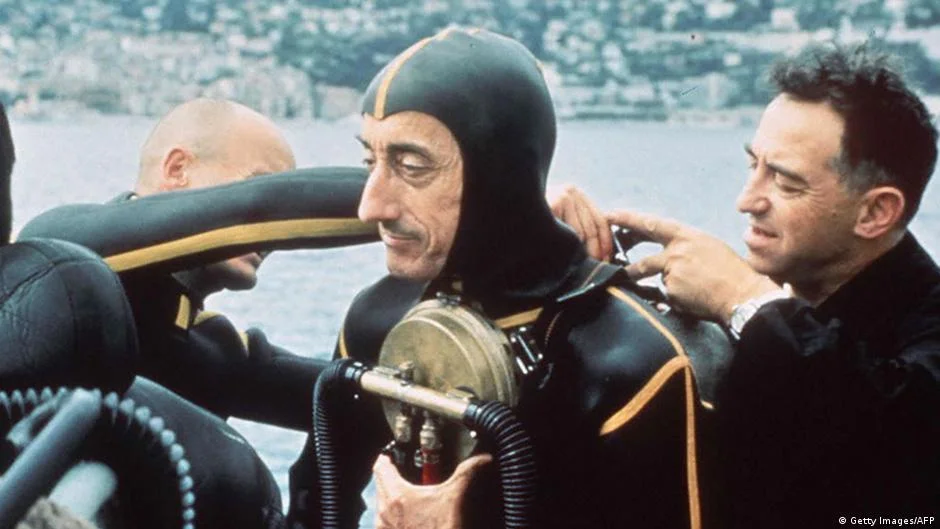
Today, scuba diving has evolved with standardized training, advanced equipment, and safety protocols that make it accessible worldwide.
Is Scuba Diving Dangerous?
This is the most common question from people considering diving. Here are reassuring scuba diving facts about safety.
According to DAN (Divers Alert Network), the fatality rate is approximately 1 death per 211,864 dives. Scuba diving has similar risk levels to jogging. You’re statistically safer on a dive than driving to the dive site.
Fun fact: Jacques Cousteau was still diving at age 86, making him one of the oldest active divers in history. His underwater documentaries inspired millions to explore beneath the waves.
The most common scuba diving injury? A broken toe. Not shark attacks or drowning, just stubbing your toe on equipment or boat decks.
What Makes Scuba Diving Safe?
Safety comes from proper training and following guidelines. When divers get into trouble, it’s usually because they skipped diving certification, dove beyond their experience, ignored safety protocols, or panicked underwater.
With proper training from certified organizations like PADI, SSI, or BSAC, scuba diving is remarkably safe. Certification teaches equipment handling, air management, buoyancy control, and emergency responses.
Medical considerations exist. People with certain heart, respiratory, or ear conditions should consult doctors before diving. But for most healthy individuals, diving is perfectly safe when you follow rules and dive within your limits.
How Deep Can You Dive?
For recreational divers, the standard depth limit is 18 to 40 meters (60 to 130 feet). Entry-level Open Water divers typically stay around 18 meters, while advanced recreational divers can explore down to 40 meters with proper training.
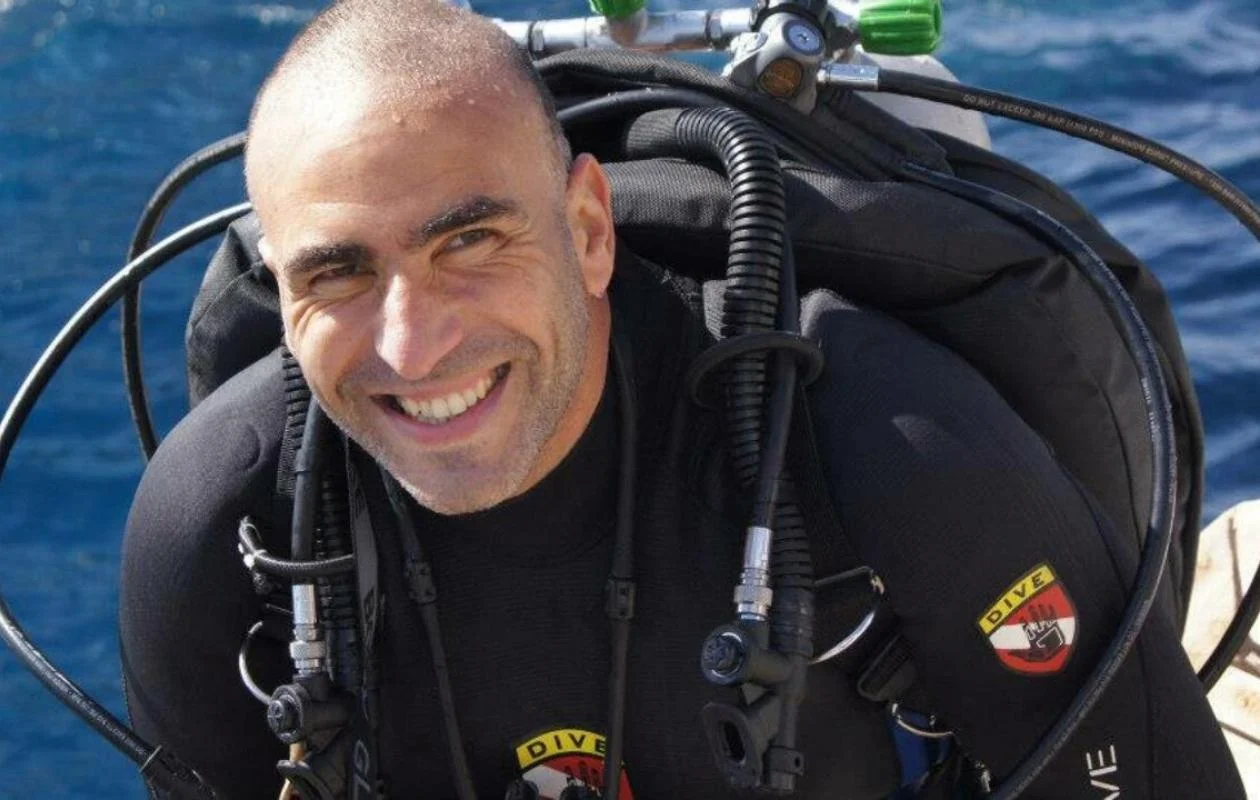
Technical divers push far beyond these limits using special gas mixtures. The current world record for the deepest scuba dive is 332.35 meters (1,090 feet), set by Egyptian diver Ahmed Gabr in 2014.
Why Can’t You Dive Deeper?
Water pressure increases dramatically with depth. For every 10 meters, pressure increases by one atmosphere. This affects your body and breathing gases, causing nitrogen narcosis, oxygen toxicity, and rapid air depletion at extreme depths.
Did you know? Ahmed Gabr’s record dive took only 12 minutes to reach maximum depth but required over 15 hours of careful ascent to avoid decompression sickness. He used multiple tanks with different gas mixtures.
Can Anyone Learn to Scuba Dive?
One of the most encouraging scuba diving facts is that this sport is remarkably accessible.
What Are the Age Requirements for Scuba Diving?
Age: Most agencies certify children from 10-12 years old. There’s no upper age limit. People get certified in their 60s, 70s, and even 80s.
Do You Need to Be a Good Swimmer?
Swimming: You need to be comfortable in water and able to swim 200 meters. You don’t need to be an expert swimmer, just have basic water skills.
Fitness: Diving doesn’t require extreme strength. Water supports your body weight. The physical demands equal a moderate hike.
Are There Medical Restrictions for Scuba Diving?
Medical Considerations: Certain conditions require medical clearance:
- Serious heart or lung conditions
- Uncontrolled epilepsy
- Severe asthma
- Chronic ear or sinus problems
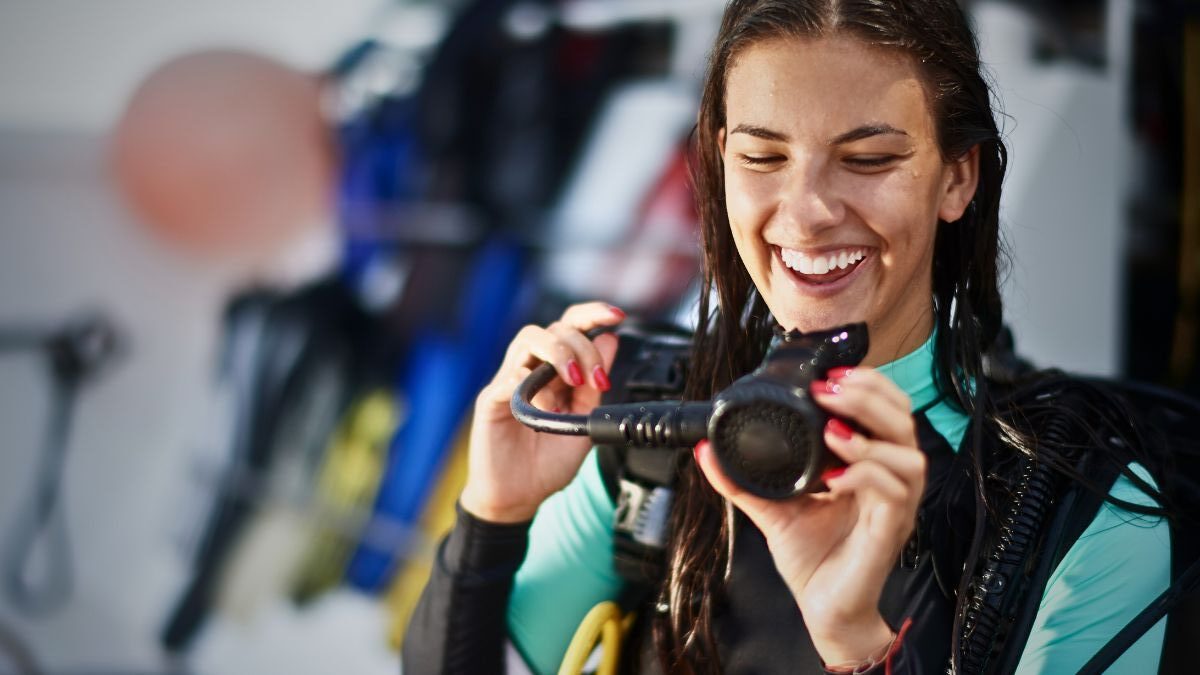
How Do You Get Certified?
Certification Process:
- Classroom or online learning (4-8 hours)
- Pool practice (4-6 hours)
- Open water dives (4 dives over 2 days)
The PADI Open Water Diver course is the most popular diving certification in history. The entire process takes 3-4 days and costs $300-500.
How Many Calories Do You Burn Scuba Diving?
Here’s a surprising scuba diving fact: diving burns 300-600 calories per hour. That’s comparable to gym workouts, but you’re surrounded by tropical fish instead of treadmills.
Why Does Scuba Diving Burn So Many Calories?
Temperature Regulation: Your body works hard to maintain core temperature. Water conducts heat 25 times faster than air.
Physical Effort: You constantly use leg muscles and work against water resistance.
Breathing Resistance: Breathing compressed air requires more effort than normal breathing.
Cold Water Bonus: Diving in colder water burns 500-600 calories per hour, while tropical water diving burns 300-400 calories per hour.
Fun fact: A typical two-tank dive day (about 2 hours underwater) can burn 800-1,200 calories total. That’s like running for an hour, except you’re exploring coral reefs instead of pavement.
The best part? Diving doesn’t feel like exercise. You’re weightless, relaxed, and focused on incredible marine life around you.
What Marine Life Will You See While Scuba Diving?
The underwater world hosts incredible diversity. When exploring beneath the waves, you might encounter:
Coral Reefs – Underwater cities teeming with thousands of colorful fish species, invertebrates, and plants. Learn more about coral reefs and how they form.
Sea Turtles – Gentle creatures commonly seen on dives. Watching a sea turtle glide through water is magical.
Dolphins – Some lucky divers encounter playful dolphins who approach out of curiosity.
Sharks – Despite scary reputations, sharks generally aren’t interested in divers.
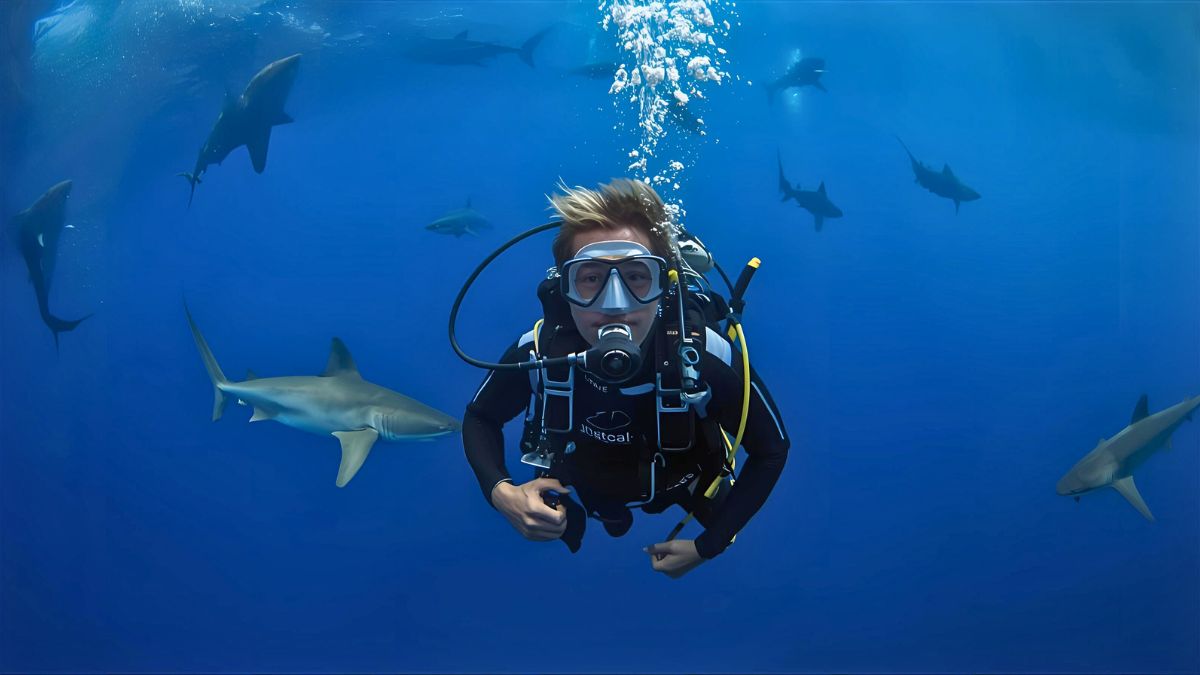
Are Sharks Really Dangerous to Divers?
You’ve probably heard the popular claim that “coconuts kill more people than sharks” – it’s frequently repeated in the diving community and makes for a great conversation starter.
While this particular statistic is actually a myth and not supported by reliable data, the underlying point is absolutely true: shark attacks on divers are extremely rare according to actual statistics.
The reality is that sharks kill approximately 8-12 people worldwide each year (across all water activities, not just diving), while humans kill approximately 30 million sharks every year. When it comes specifically to scuba divers, shark attacks are virtually nonexistent. Sharks are far more afraid of us than we should be of them.
Did you know? The most popular diving specialty certification worldwide is underwater photography. Divers love capturing images of incredible marine life and sharing photos to promote ocean conservation.
What Does the Underwater World Look Like?
The underwater environment is visually stunning and scientifically fascinating:
How Do Colors Change Underwater?
Colors Change with Depth: Water absorbs different light wavelengths at different rates. Red disappears within 5 meters, then orange, yellow, and green. By 30 meters, everything looks blue or gray. This is why underwater photographers use lights to bring back true colors.
Objects Look Bigger: Due to light refraction, everything appears approximately 33% larger and 25% closer than it actually is. That huge fish might have been more modest in size.
Sound Travels Faster: Sound waves travel about five times faster in water than air. However, this makes it difficult to determine which direction sounds come from.
Weightlessness: Achieving neutral buoyancy lets you hover motionless in the water column, similar to astronaut weightlessness. Many divers describe this as the most peaceful, meditative sensation they’ve experienced.
Can You Scuba Dive at Night?
Absolutely! Night diving is thrilling and safer than you might think.
When the sun sets, the underwater world transforms. Many marine creatures are nocturnal, appearing only at night:
- Octopuses hunting for food
- Lobsters and crabs emerging from hiding
- Bioluminescent organisms that glow in the dark
- Sleeping fish tucked into reef crevices
- Hunting predators like moray eels
Night dives require special training and equipment, primarily dive lights. You carry a primary light and at least one backup. Discover UV night diving for an even more spectacular experience.
Fun fact: Some divers experience bioluminescence during night dives. Turn off your light and wave your hand through water to see sparkles and light trails. It’s like swimming through a starfield.
Most night dives happen at sites you’ve visited during the day, so terrain is familiar. You dive with a buddy, follow your light, and stay close to the guide.
Where Are the Best Places to Go Scuba Diving?
The world is full of incredible dive sites:
Great Barrier Reef, Australia – The world’s largest coral reef system with thousands of species.
Maldives – Crystal-clear waters with 30+ meter visibility. Famous for manta rays and shark encounters.
Cenotes, Mexico – Freshwater sinkholes offering unique underwater cave exploration with gin-clear water.
Red Sea, Egypt – Warm year-round water, stunning reefs, and famous wreck dives.
Galapagos Islands, Ecuador – Schools of hundreds of hammerhead sharks, whale sharks, and sea lions.
Costa Rica’s Pacific Coast – World-class diving with bull sharks, manta rays, whale sharks, and humpback whales during migration. Rich biodiversity and year-round conditions make it a premier Central American destination.
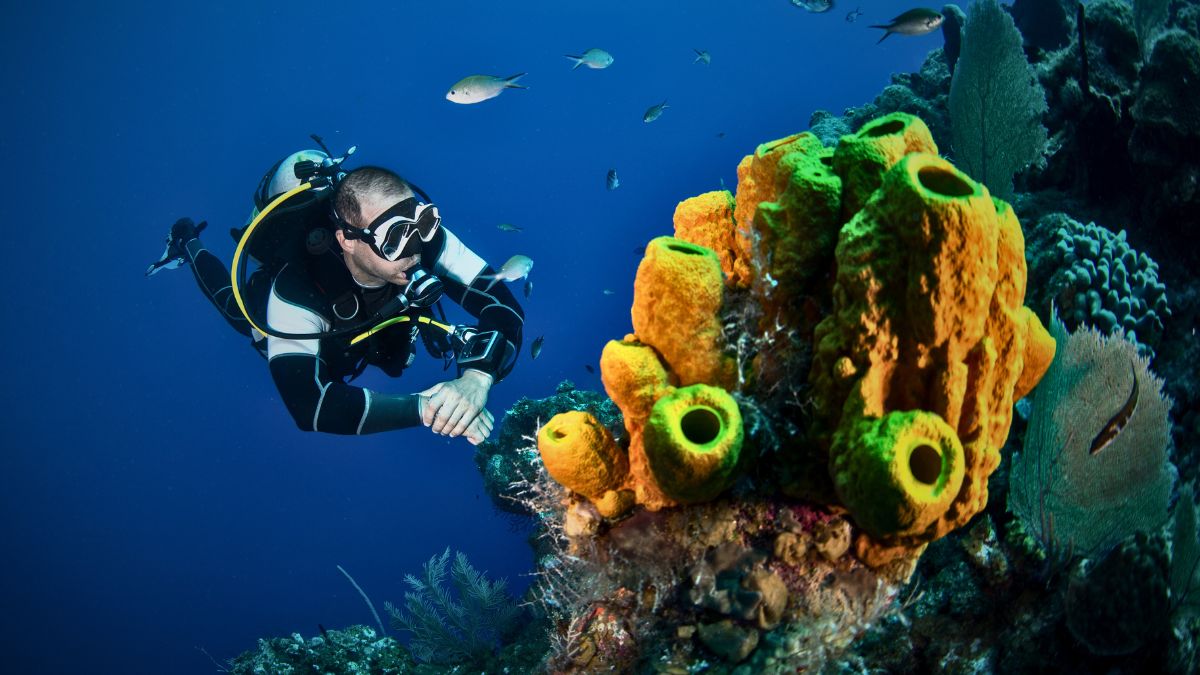
Surprising Scuba Diving Facts You Probably Didn’t Know
World Record for Longest Dive
In 2016, Turkish diver Cem Karabay spent 192 hours, 42 minutes, and 42 seconds underwater. That’s over 8 days submerged in a pool.
Global Diving Community
There are approximately 6 million active scuba divers worldwide who’ve dived within the last 12 months.
Limited Ocean Exploration
Even if you dove everywhere within recreational limits (40 meters depth), you would only explore 4% of the world’s oceans. The vast majority remains unexplored.
Economic Powerhouse
Scuba diving generates more global revenue than many mainstream sports, surprisingly surpassing activities like golf.
The Instructor Paradox
Despite industry success, diving instructors have one of the lowest salaries in the sports industry. Most do it for passion, living in beautiful locations and sharing their ocean love.
PADI Dominates (for the moment)
The PADI Open Water Diver certification is the most popular diving course in history, certifying about 70% of the world’s recreational divers.
Did you know? Costa Rica offers some of the best learn-to-dive conditions worldwide. Warm Pacific waters, incredible biodiversity, and professional operations make it ideal for getting certified while experiencing world-class diving.
Many divers describe their first breaths underwater as life-changing. The combination of weightlessness, marine life beauty, and exploring an alien environment creates an experience unlike anything else on Earth.
Dive Into Your Next Adventure
Scuba diving facts reveal a sport that’s safer than most think, accessible to almost anyone, and rewarding in ways extending far beyond underwater experiences. From burning calories to reducing stress, from witnessing incredible marine life to joining a global community, diving offers benefits few activities can match.
The ocean covers 71% of our planet, and scuba diving is your key to unlocking this vast frontier. Whether swimming with sea turtles, exploring shipwrecks, or floating weightless among coral reefs, every dive is a new adventure.
Ready to take the plunge? The underwater world is waiting, and there’s never been a better time to start your diving journey.
Sources used in writing this blog
- Centers for Disease Control and Prevention (CDC). “Health Benefits of Water-based Exercise.”
- American Red Cross “Swimming and Water Safety Guidelines.”
- PADI Official Website – Professional Association of Diving Instructors
- Divers Alert Network (DAN) – Diving Safety and Medical Information
- Wikipedia
- Many years of diving experience as an instructor

